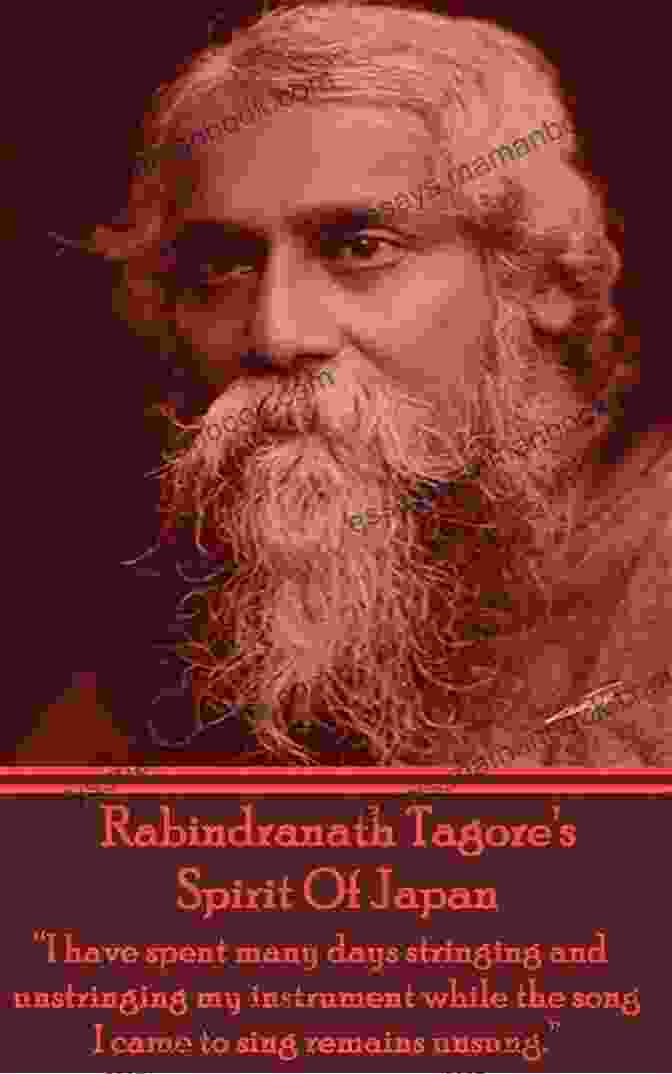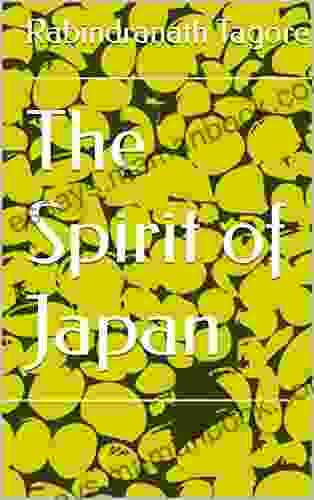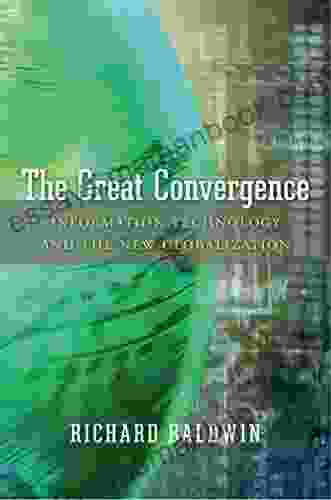The Spirit of Japan: A Journey into the Heart of a Nation's Soul

In the tapestry of world literature, Rabindranath Tagore's "The Spirit of Japan" stands as a masterpiece, a profound exploration of the cultural and spiritual essence of Japan. Written in 1916, during a time of heightened global tensions, Tagore's work offers a beacon of understanding, bridging the gap between East and West, and illuminating the unique spirit that animates the Japanese people.
4.2 out of 5
| Language | : | English |
| File size | : | 6582 KB |
| Text-to-Speech | : | Enabled |
| Screen Reader | : | Supported |
| Enhanced typesetting | : | Enabled |
| Print length | : | 21 pages |
| Lending | : | Enabled |
Tagore, an Indian poet, philosopher, and Nobel laureate, embarked on a journey to Japan in 1916, seeking to deepen his understanding of the country's rich cultural heritage. During his travels, he immersed himself in the traditions, customs, and art forms of Japan, engaging with scholars, artists, and ordinary citizens alike. The result of his experiences is "The Spirit of Japan," a work that transcends mere travelogue, becoming a profound meditation on the nature of culture, art, and human existence.
A Nation's Cultural Tapestry: Beauty, Harmony, and Tradition
Tagore's journey through Japan was one of discovery and enlightenment, as he encountered a culture deeply rooted in beauty, harmony, and tradition. He was captivated by the exquisite beauty of Japanese gardens, the vibrant colors and intricate designs of traditional clothing, and the delicate craftsmanship of tea ceremonies. In these cultural expressions, he saw a reflection of the Japanese people's deep appreciation for aesthetics and their commitment to living in harmony with nature.
Particular attention is paid to the Japanese concept of "mono no aware," a profound sense of impermanence and the beauty found within it. Tagore explores how this concept permeates Japanese art and literature, creating a unique perspective on the cycle of life and the fleeting nature of existence. This understanding of impermanence, rather than leading to despair, inspires a deep appreciation for the present moment and a profound sense of gratitude.
The Spirit of Bushido: Honor, Discipline, and Self-Sacrifice
Beyond the realm of aesthetics, Tagore also delves into the martial spirit of Japan, embodied in the code of bushido. He examines the samurai's unwavering loyalty, their rigorous discipline, and their readiness to sacrifice their lives for honor. While acknowledging the potential dangers of militarism, Tagore finds in bushido a profound code of ethics that emphasizes selflessness, courage, and unwavering resolve.
Tagore draws parallels between the Japanese spirit of bushido and the Indian concept of dharma, highlighting the universal human values that transcend cultural boundaries. He sees in both traditions a path to personal growth, self-discipline, and a deep sense of duty towards one's community.
East Meets West: A Dialogue of Civilizations
"The Spirit of Japan" is not merely a celebration of Japanese culture; it is also a profound meditation on the nature of cultural exchange and the need for mutual understanding between East and West. Tagore argues that the world can benefit greatly from a dialogue between these two distinct civilizations, each with its unique strengths and perspectives.
He urges the West to embrace the spiritual wisdom of the East, its emphasis on harmony, compassion, and the interconnectedness of all living things. Conversely, he challenges Japan to learn from the West's scientific advancements and its commitment to individual rights and democratic values.
Tagore believed that true progress lies in the synthesis of the best elements of both Eastern and Western civilizations. He envisions a future where the world's cultures coexist harmoniously, enriching one another and creating a truly global civilization.
A Timeless Legacy: The Enduring Impact of 'The Spirit of Japan'
Over a century since its initial publication, "The Spirit of Japan" continues to be a seminal work, inspiring generations of readers and scholars. Its insights into Japanese culture, its exploration of universal human values, and its call for cross-cultural understanding resonate deeply in today's globalized world.
The book has been translated into numerous languages and has become a classic of comparative literature. It is studied in universities and cultural institutions worldwide, serving as a bridge between different cultures and a catalyst for meaningful dialogue.
Tagore's work has had a profound impact on the development of intercultural understanding and has contributed to a greater appreciation of the diversity and richness of human civilizations. It is a testament to his enduring legacy as a global thinker and a tireless advocate for peace and harmony.
In an era of increasing globalization and cultural exchange, "The Spirit of Japan" remains a vital and relevant work. It reminds us of the importance of embracing diversity, fostering intercultural understanding, and seeking common ground amidst our differences.
As we navigate the complexities of the 21st century, Tagore's message of unity and dialogue continues to guide us. His vision of a world where different cultures coexist harmoniously, sharing their wisdom and enriching one another, is more relevant than ever.
Ultimately, "The Spirit of Japan" is a timeless treasure, a work that transcends its time and place to offer profound insights into the human experience and the universal quest for meaning and connection.

4.2 out of 5
| Language | : | English |
| File size | : | 6582 KB |
| Text-to-Speech | : | Enabled |
| Screen Reader | : | Supported |
| Enhanced typesetting | : | Enabled |
| Print length | : | 21 pages |
| Lending | : | Enabled |
Do you want to contribute by writing guest posts on this blog?
Please contact us and send us a resume of previous articles that you have written.
 Top Book
Top Book Novel
Novel Fiction
Fiction Nonfiction
Nonfiction Literature
Literature Paperback
Paperback Hardcover
Hardcover E-book
E-book Audiobook
Audiobook Bestseller
Bestseller Classic
Classic Mystery
Mystery Thriller
Thriller Romance
Romance Fantasy
Fantasy Science Fiction
Science Fiction Biography
Biography Memoir
Memoir Autobiography
Autobiography Poetry
Poetry Drama
Drama Historical Fiction
Historical Fiction Self-help
Self-help Young Adult
Young Adult Childrens Books
Childrens Books Graphic Novel
Graphic Novel Anthology
Anthology Series
Series Encyclopedia
Encyclopedia Reference
Reference Guidebook
Guidebook Textbook
Textbook Workbook
Workbook Journal
Journal Diary
Diary Manuscript
Manuscript Folio
Folio Pulp Fiction
Pulp Fiction Short Stories
Short Stories Fairy Tales
Fairy Tales Fables
Fables Mythology
Mythology Philosophy
Philosophy Religion
Religion Spirituality
Spirituality Essays
Essays Critique
Critique Commentary
Commentary Glossary
Glossary Bibliography
Bibliography Index
Index Table of Contents
Table of Contents Preface
Preface Introduction
Introduction Foreword
Foreword Afterword
Afterword Appendices
Appendices Annotations
Annotations Footnotes
Footnotes Epilogue
Epilogue Prologue
Prologue Adeola Akintoye
Adeola Akintoye Barnaby Hazen
Barnaby Hazen Sean Starr
Sean Starr M J Logue
M J Logue Pamela Ellgen
Pamela Ellgen Richard M Knittle Jr
Richard M Knittle Jr Christie Golden
Christie Golden Junji Ito
Junji Ito Francesca Clare Rayner
Francesca Clare Rayner Rachel Morgan
Rachel Morgan Lindsay Price
Lindsay Price Piper Rayne
Piper Rayne Adeval De Andrade
Adeval De Andrade Tennessee Williams
Tennessee Williams Cody Rose Clevidence
Cody Rose Clevidence Dan Parent
Dan Parent Shelly Tochluk
Shelly Tochluk Jessica Scarlett
Jessica Scarlett Mrs Autumn Mckay
Mrs Autumn Mckay Emily Skinner
Emily Skinner
Light bulbAdvertise smarter! Our strategic ad space ensures maximum exposure. Reserve your spot today!

 William GoldingDragons And Stuff: An Epic Fantasy Series That Will Ignite Your Imagination
William GoldingDragons And Stuff: An Epic Fantasy Series That Will Ignite Your Imagination
 Dan HendersonAfter Darkness Falls: Vampire Romance - A Literary Exploration of Love and...
Dan HendersonAfter Darkness Falls: Vampire Romance - A Literary Exploration of Love and... Gordon CoxFollow ·4.1k
Gordon CoxFollow ·4.1k Jarrett BlairFollow ·5.9k
Jarrett BlairFollow ·5.9k Edwin BlairFollow ·8.8k
Edwin BlairFollow ·8.8k Floyd PowellFollow ·8.1k
Floyd PowellFollow ·8.1k Calvin FisherFollow ·11.5k
Calvin FisherFollow ·11.5k Angelo WardFollow ·17.1k
Angelo WardFollow ·17.1k Jorge AmadoFollow ·6.2k
Jorge AmadoFollow ·6.2k Dave SimmonsFollow ·14.7k
Dave SimmonsFollow ·14.7k

 Dean Butler
Dean ButlerBlack Widow 2024: A Comprehensive Guide to Kelly...
In 2024, Marvel...

 Gage Hayes
Gage HayesNothing and the Speck: An In-Depth Analysis of Yana...
Yana Toboso's works, particularly the manga...

 Stan Ward
Stan WardThe Best American Poetry 1997: James Tate
The Best American Poetry...

 Corey Green
Corey GreenThe Chance of Home: Exploring the Poetic Landscape of...
Immerse yourself in the evocative world of...
4.2 out of 5
| Language | : | English |
| File size | : | 6582 KB |
| Text-to-Speech | : | Enabled |
| Screen Reader | : | Supported |
| Enhanced typesetting | : | Enabled |
| Print length | : | 21 pages |
| Lending | : | Enabled |












